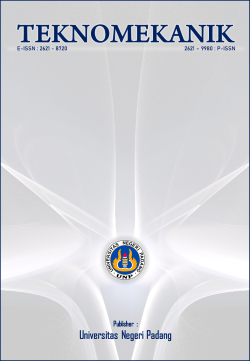Aims and Scope
Aims
Jurnal Pendidikan Teknologi Kejuruan aims to present high-quality and relevant scientific articles in the form of original research results in the field of Technical and Vocational Education and Training. By showcasing the latest teaching techniques, effective instructional methods, and recent advancements in relevant technologies, this journal provides a significant contribution to the enhancement of superior vocational education and engineering development. The journal strives to become a reliable reference source for researchers, academics, and practitioners worldwide. All articles published undergo a rigorous process of selection and peer review, ensuring that the information presented in this journal maintains a high level of credibility.
Scope
The scope of research in the field of Technical and Vocational Education and Training (TVET) encompasses a wide range of topics related to the education and training provided for various technical and vocational skills. This field involves the study and improvement of educational programs, training methodologies, and strategies that prepare individuals for specific careers and industries.
The scope of TVET research includes, but is not limited to, the following areas:
- Curriculum Development: Research focuses on designing and updating curricula that align with industry needs, technological advancements, and job market demands.
- Teaching and Learning Methods: Studies explore effective pedagogical approaches, instructional techniques, and innovative technologies that enhance the teaching and learning experience in vocational settings.
- Workforce Development: Research examines strategies to bridge the gap between education and the workforce, ensuring graduates possess the skills and competencies required by industries.
- Skill Assessment and Certification: Investigations into valid and reliable methods for assessing vocational skills, as well as the development of certification standards that validate individuals' proficiency.
- Industry-University Collaboration: Studies analyze partnerships between educational institutions and industries to ensure that educational programs remain up-to-date and relevant.
- Apprenticeships and Internships: Research into structured on-the-job training experiences that allow students to acquire practical skills and experience real work environments.
- Lifelong Learning and Continuing Education: Exploration of strategies for ongoing skills development and training for individuals to adapt to changing job market requirements.
- Gender Equality and Inclusivity: Investigations into promoting gender-balanced participation and inclusivity in traditionally male-dominated vocational fields.
- Technological Advancements: Research on the integration of emerging technologies, such as digital tools and Industry 4.0 concepts, into vocational training programs.
- Quality Assurance: Studies on mechanisms to ensure the quality of vocational education and training programs, including accreditation and evaluation processes.
- Policy and Governance: Examination of policies and regulations that shape TVET systems and their effectiveness in promoting skill development and employability.
- Socioeconomic Impact: Research into the influence of TVET on economic growth, social mobility, and addressing unemployment challenges.
Engineering encompasses a diverse range of topics that contribute to the advancement and application of engineering principles across various disciplines, providing valuable learning opportunities in vocational education.
Media Technology: Leveraging these technology media resources can enhance the vocational education experience by providing diverse learning materials, facilitating collaboration, and keeping learners informed about the latest developments in their chosen field. (Online Courses and Platforms, YouTube Channels and Tutorials, Podcasts, Tech Blogs and Websites, Interactive Learning Platforms, Educational Apps, Virtual Reality (VR) and Augmented Reality (AR), Webinars and Online Events, Social Media Communities, and E-books and Digital Publications).




